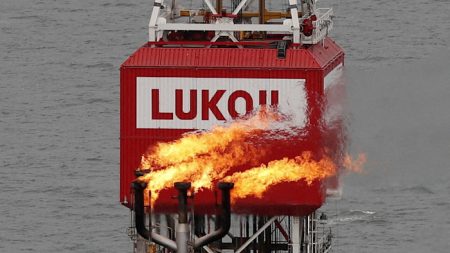Unlock the Editor’s Digest for free
Roula Khalaf, Editor of the FT, selects her favourite stories in this weekly newsletter.
Mining and trading group Glencore recorded a big increase in carbon emissions last year after it expanded coal production and restarted an oil refinery in South Africa that was closed by an explosion.
The company’s emissions rose 8.8 per cent in 2023 to 432.8mn tonnes of CO₂ equivalent compared with the previous year, a reverse in the downward trend of recent years.
Glencore said in its annual report on Wednesday that it was still “on track” to meet its emissions target for a 15 per cent reduction on 2019 levels by the end of 2026 and more ambitious targets beyond that date. It is currently ahead of its first target, having cut total emissions by 21.8 per cent, it said.
The FTSE-listed company has had a fierce debate with shareholders about climate strategy, with executives arguing it is better to retain and responsibly run down fossil fuel assets rather than sell them to other operators.
Five of its coal mines have already been shut since 2019 and it will close at least seven more by 2035. It has committed to buying or building no new coal mines but does plan to expand production at existing mines.
Glencore has long insisted it needs to be able to respond to market conditions and other factors, in addition to meeting climate targets.
On Wednesday, it also published a new 2030 target — to cut CO₂ emissions by 25 per cent from 2019 levels — with the intention of giving shareholders more information about how it will reach its target of a 50 per cent cut by 2035.
The majority of Glencore’s emissions are classed as “Scope 3” — arising from its customers’ use of commodities such as coal, oil and natural gas that it produces and trades. All of Glencore’s climate targets include Scope 3 emissions.
One major factor in the rise in CO₂ emissions last year was the reopening of the Astron Energy Refinery in Cape Town, South Africa’s third-largest crude oil refinery, which had closed after an explosion in 2020 that killed two people.
Another factor was higher coal output, to meet global demand after Russia’s invasion of Ukraine pushed up gas prices.
Glencore has promised to spin off its coal business as a standalone company within 24 months of the closing of a $6.9bn deal it made in November to buy the coal division of Canada’s Teck Resources.
The company does not plan to include Teck’s mines in its current baseline emissions and decarbonisation targets but said its plan to reduce coal output to meet its net zero emissions target by 2050 would remain intact in the event of the spin-off, “subject to a supportive policy environment”.
The report also showed that Glencore chief executive Gary Nagle was paid $5.8mn last year, compared with $6mn a year earlier.
Read the full article here














